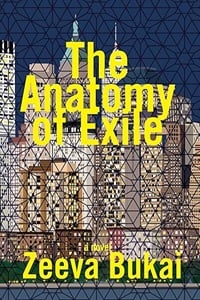Congratulations to author Zeeva Bukai whose novel The Anatomy of Exile has won the 75th National Jewish Book Award for Debut Fiction. The awards are “given to English-language books of Jewish interest… which represent the best of Jewish literature and authors and their contributions,” the Jewish Book Council said in its announcement.
Listed as one of the Awards’ notable winners, the novel The Anatomy of Exile was published by Delphinium Books in January 2025.
 My review of the book noted that its “storytelling is rich with details and the author skillfully brings the characters to life with sentimentally charged dialogues.” I wrote that “readers will be captivated by this intimate journey of an Israeli family into their self-imposed exile, and by the struggles of [its protagonist] to keep her daughter safe, her marriage intact, and to find the way to bring her family back to the country she knows as home.”
My review of the book noted that its “storytelling is rich with details and the author skillfully brings the characters to life with sentimentally charged dialogues.” I wrote that “readers will be captivated by this intimate journey of an Israeli family into their self-imposed exile, and by the struggles of [its protagonist] to keep her daughter safe, her marriage intact, and to find the way to bring her family back to the country she knows as home.”
The award comes just days before the release of Bukai’s second novel, The World Between (Delphinium Books, February 24, 2026). While markedly different in setting and structure, it is similarly ambitious in scope. The novel tells the story of a once-renowned actress of the Yiddish stage who arrives in Tel Aviv, only to find herself confined to a hospice in Jaffa. It is unclear to the woman, and to readers, how she came to be there. Only by peeling back layers of memory, Holocaust survival, Siberian gulags, marriage, friendship, and long-buried trauma, do we see the full beauty of the author’s powerful and moving prose.
Bukai is certainly deserving of the National Jewish Book Award and as a reader, I look forward to her future works of fiction.
Zeeva Bukai was born in Israel and raised in New York City. Her stories have been published in Carve Magazine, Pithead Chapel, the Lilith anthology Frankly Feminist: Stories by Jewish Women, December Magazine, Image Journal, Jewishfiction.net, Women’s Quarterly Journal, and the Jewish Quarterly. She is the Assistant Director of Academic Support at SUNY Empire State University and lives in Brooklyn with her family.
Originally posted on The Times of Israel.





